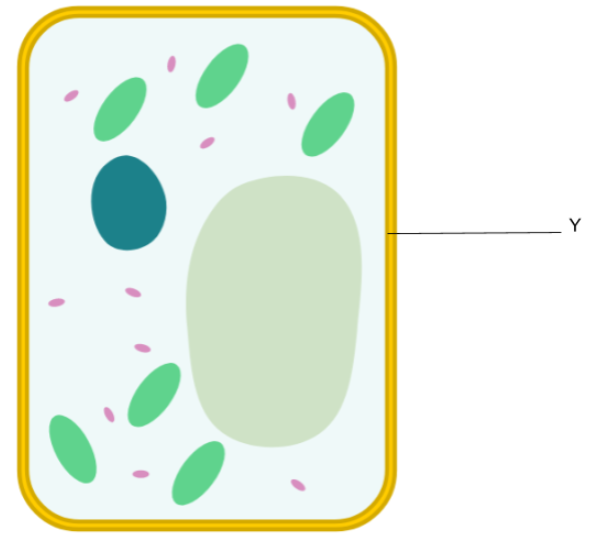
Look at the given cell carefully, Identify the function of the part labelled Y

A) It controls the movement of material in and around the cell
B) It controls all the activities of the cell
C) It contains many cell parts
D) It provides protection to the cell

Answer
573.6k+ views
Hint:In all known organisms, the cell is the basic structural, functional , and biological unit. The smallest unit of life is a cell. The "building blocks of life" are often called cells. Cell biology, cell biology, or cytology are called the study of cells.
Complete answer:
The cell organelle is a specialised organism that performs a specific role within a specific type of cell.
There are different cell organelles, some of which are typical in most cell types, such as cell membranes, nuclei, and cytoplasm. Some organelles, however, are unique in plant cells to one specific type of cell-like plastids and cell walls.
The cell wall is a tough, rigid layer that, except for animal cells, covers the cells. It is situated outside the membrane of the cell. The composition of the cell wall varies from organism to organism, e.g:cellulose is the plant cell wall, chitin is the fungal cell wall, and peptidoglycan is the bacterial cell wall.Providing rigidity, tensile strength, structural support, protection against mechanical stress and infection is the main feature of the cell wall. It also helps to disperse gases in and out of the cell.
The cell wall is an additional non-living layer outside the cell membrane in certain cells that provides the cell with structure, defence, and filtering mechanisms.
Structure :The cell wall in a plant cell consists of cellulose , hemicellulose, and proteins, while chitin is made of chitin in a fungal cell.
With a middle lamina, a main cell wall, and a secondary cell wall, the cell wall is multilayered.The middle lamina contains adhesive polysaccharides that cause the cells to be bound to each other.
The primary cell wall that consists of cellulose is after the middle lamina. A secondary cell wall made from cellulose and hemicellulose is the last layer, which is not always present.
The plasma membrane of plant cells is surrounded by the cell wall and provides tensile strength and protection against mechanical and osmotic stress. Turgor pressure, which is the pressure of the cell contents against the cell wall, may also be produced by cells.
The correct answer is option (D) It provides protection to the cell.
Note:Plant cells, including chloroplasts, cell walls, and intracellular vacuoles, have many distinguishing characteristics. In chloroplasts, photosynthesis takes place; cell walls allow plants to have solid, upright structures; and vacuoles help control how water is treated by cells and other molecules are processed.
Complete answer:
The cell organelle is a specialised organism that performs a specific role within a specific type of cell.
There are different cell organelles, some of which are typical in most cell types, such as cell membranes, nuclei, and cytoplasm. Some organelles, however, are unique in plant cells to one specific type of cell-like plastids and cell walls.
The cell wall is a tough, rigid layer that, except for animal cells, covers the cells. It is situated outside the membrane of the cell. The composition of the cell wall varies from organism to organism, e.g:cellulose is the plant cell wall, chitin is the fungal cell wall, and peptidoglycan is the bacterial cell wall.Providing rigidity, tensile strength, structural support, protection against mechanical stress and infection is the main feature of the cell wall. It also helps to disperse gases in and out of the cell.
The cell wall is an additional non-living layer outside the cell membrane in certain cells that provides the cell with structure, defence, and filtering mechanisms.
Structure :The cell wall in a plant cell consists of cellulose , hemicellulose, and proteins, while chitin is made of chitin in a fungal cell.
With a middle lamina, a main cell wall, and a secondary cell wall, the cell wall is multilayered.The middle lamina contains adhesive polysaccharides that cause the cells to be bound to each other.
The primary cell wall that consists of cellulose is after the middle lamina. A secondary cell wall made from cellulose and hemicellulose is the last layer, which is not always present.
The plasma membrane of plant cells is surrounded by the cell wall and provides tensile strength and protection against mechanical and osmotic stress. Turgor pressure, which is the pressure of the cell contents against the cell wall, may also be produced by cells.
The correct answer is option (D) It provides protection to the cell.
Note:Plant cells, including chloroplasts, cell walls, and intracellular vacuoles, have many distinguishing characteristics. In chloroplasts, photosynthesis takes place; cell walls allow plants to have solid, upright structures; and vacuoles help control how water is treated by cells and other molecules are processed.
Recently Updated Pages
Master Class 11 Computer Science: Engaging Questions & Answers for Success

Master Class 11 Business Studies: Engaging Questions & Answers for Success

Master Class 11 Economics: Engaging Questions & Answers for Success

Master Class 11 English: Engaging Questions & Answers for Success

Master Class 11 Maths: Engaging Questions & Answers for Success

Master Class 11 Biology: Engaging Questions & Answers for Success

Trending doubts
One Metric ton is equal to kg A 10000 B 1000 C 100 class 11 physics CBSE

There are 720 permutations of the digits 1 2 3 4 5 class 11 maths CBSE

Discuss the various forms of bacteria class 11 biology CBSE

Draw a diagram of a plant cell and label at least eight class 11 biology CBSE

State the laws of reflection of light

Explain zero factorial class 11 maths CBSE




